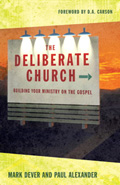
Mark Dever and Paul Alexander
Reviewed by: George C. Hamond
The Deliberate Church: Building Your Ministry on the Gospel, by Mark Dever and Paul Alexander. Published by Crossway Books, 2005. Paperback, 221 pages, list price $12.99. Reviewed by Pastor George C. Hammond.
If the title of this book sounds like The Purpose-Driven Church to you, it was meant to. The authors confess at the start of the book that they hope to entice those who are into books on the latest church-growth fads. The message of the book, though, is diametrically opposed to the human wisdom that is so often found in such books.
The authors consistently apply biblical methodology and encourage biblical criteria by which to measure success. Although the church at which they serve (Capitol Hill Baptist Church in Washington, D.C.) is quite large, they consistently direct their readers away from evaluating worth by size, and instead encourage evaluating worth by faithfulness to the Master and his message and methods. They remind us to take a long view, and to be patient and diligent as well as faithful in the work of the gospel.
Refreshingly, there are chapters devoted to church discipline and to the regulative principle of worship. There is a helpful discussion of the selection of music for worship that advocates neither throwing open the musical floodgates nor remaining intransigently calcified in the style of some bygone era (pp. 115-30).
In many ways, the book reads like a popularized and colloquial version of the OPC's Book of Church Order, specifically the Form of Government and the Book of Discipline. It has many practical applications for Bible studies, Sunday school, and small-group and midweek meetings. Young pastors would profit from the practical applications of the biblical principles set forth in this book. Men who have labored long and hard in variegated soil and have seen little fruit numerically speaking will garner encouragement from this work. It could also benefit small groups and Bible studies in our churches as a starting point for explaining the biblical reasons why we maintain church rolls, practice church discipline, and generally act as stewards and overseers rather than owners and innovators.
Caveats? I have three. Being Baptists, the authors do not consider the children of believers to be members of the church. They also believe that Christian baptism is essentially John's baptism - an expression of one's own faith and repentance, rather than the sign of the new covenant which displays God's faithfulness (an understandable mistake dealt with in Acts 18:24 - 19:5, but which our Baptist brothers continue to make). Lastly, while they believe that a plurality of elders is good and biblical, they do not think that elders are absolutely necessary for the life and health of the church, which in their view is essentially congregational in government (see pp. 131-35).
The book is refreshing and encouraging. If it is read and heeded in broad evangelical circles, it will greatly encourage a return to the old paths upon which the church has always best been able to sing a new song and walk in newness of life.
September 07, 2025
August 31, 2025
J. N. Darby and the Roots of Dispensationalism
August 24, 2025
August 17, 2025
Reformed Covenant Theology: A Systematic Introduction
August 10, 2025
August 03, 2025
July 27, 2025
© 2025 The Orthodox Presbyterian Church